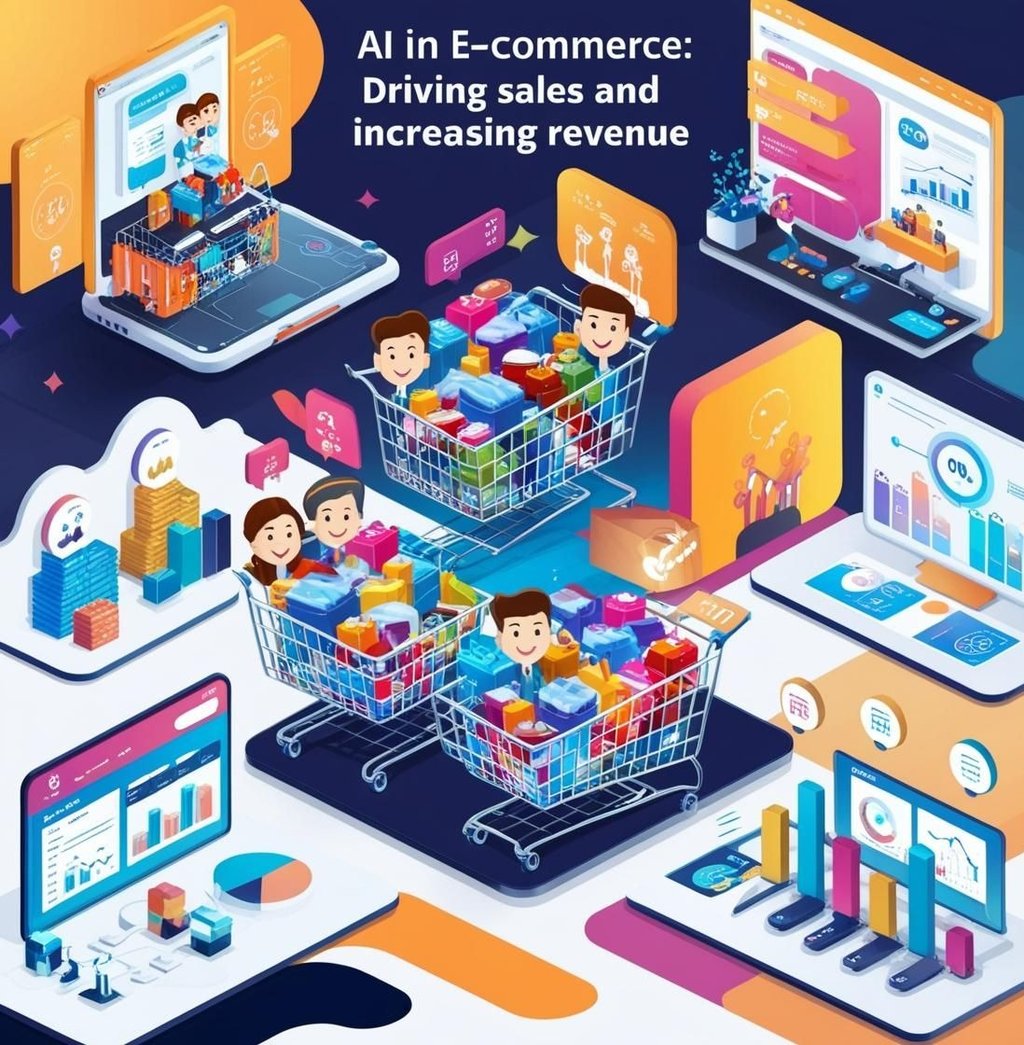Revolutionizing E-Commerce with AI
This article explores the transformative impact of Artificial Intelligence (AI) in the e-commerce industry. It highlights the benefits of AI, such as personalized customer experiences, efficient inventory management, dynamic pricing strategies, and enhanced marketing campaigns. Featuring real-world success stories from companies like Amazon, Sephora, and Stitch Fix, it provides practical insights into how AI drives sales and boosts revenue. The article also outlines actionable strategies for implementing AI in e-commerce businesses while addressing potential challenges, including implementation costs and data privacy concerns. Designed for business owners, this guide emphasizes why embracing AI is essential for staying competitive in today's digital landscape.
AI EARNINGS
AI Tech
1/6/20252 min read


AI in E-Commerce: How to Use AI to Drive Sales and Increase Revenue
Artificial Intelligence (AI) is revolutionizing the e-commerce industry, offering businesses innovative ways to enhance customer experiences, optimize operations, and boost revenue. In this article, we’ll explore how AI can be leveraged in e-commerce, highlight real-world success stories, and discuss the benefits, strategies, and challenges of adopting AI technologies.
The Benefits of AI in E-Commerce
1. Personalized Customer Experiences
AI enables e-commerce businesses to deliver tailored experiences by analyzing customer behavior, preferences, and purchase history. Personalization can range from product recommendations to dynamic pricing, improving customer satisfaction and increasing sales.
2. Efficient Inventory Management
AI-powered tools predict demand trends, helping businesses optimize inventory levels, reduce waste, and prevent stockouts or overstocking.
3. Enhanced Customer Support
Chatbots and AI-driven virtual assistants provide 24/7 customer support, answering common queries and guiding customers through their shopping journey.
4. Dynamic Pricing Strategies
AI algorithms analyze market conditions, competitor pricing, and demand patterns to suggest optimal pricing strategies, ensuring competitiveness and profitability.
5. Improved Marketing Campaigns
AI streamlines marketing by analyzing data to identify target audiences, predict campaign outcomes, and automate ad placements for maximum ROI.
Real-World Success Stories
1. Amazon: Personalized Recommendations
Amazon’s recommendation engine uses AI to suggest products based on user behavior and past purchases. This personalization strategy accounts for a significant portion of its revenue, showcasing the power of AI-driven upselling and cross-selling.
2. Sephora: Virtual Try-On Experiences
Sephora leverages AI through its Virtual Artist tool, allowing customers to try makeup products virtually. This innovation has boosted customer engagement and conversion rates.
3. Stitch Fix: AI-Driven Styling Services
Stitch Fix combines AI algorithms with human stylists to recommend clothing items tailored to individual preferences. The hybrid approach has significantly enhanced customer satisfaction and retention.
Strategies to Implement AI in Your E-Commerce Business
1. Invest in AI-Powered Tools
Explore AI platforms that align with your business goals, such as chatbots (e.g., Zendesk, Tidio), recommendation engines (e.g., Dynamic Yield), or inventory management systems (e.g., Blue Yonder).
2. Focus on Data Collection
Collect and organize customer data responsibly to fuel AI systems. Ensure compliance with data protection regulations like GDPR or CCPA.
3. Enhance Customer Interaction
Integrate AI-driven chatbots to provide immediate assistance and personalize user experiences through targeted marketing.
4. Leverage Predictive Analytics
Use AI to forecast sales trends, customer preferences, and seasonal demands, enabling proactive business decisions.
Challenges of Using AI in E-Commerce
1. High Implementation Costs
AI systems often require significant upfront investment, which can be a barrier for small businesses.
2. Data Privacy Concerns
Collecting and processing customer data raises privacy issues. Businesses must ensure transparency and compliance with regulations.
3. Integration Complexity
Integrating AI solutions with existing systems can be technically challenging and may require expert assistance.
4. Dependency on Data Quality
AI relies heavily on accurate and comprehensive data. Incomplete or incorrect data can lead to poor results and customer dissatisfaction.
Conclusion
AI offers transformative potential for e-commerce businesses, from personalizing customer experiences to streamlining operations and boosting revenue. While challenges exist, adopting the right strategies can help overcome them and unlock AI’s full potential. Real-world success stories, like those of Amazon and Sephora, highlight the benefits of investing in AI. For business owners, the time to explore AI in e-commerce is now—embrace the innovation and stay ahead of the competition.
Inspire
Learn how to make money with AI technologies
contact us
Harness
© 2025. All rights reserved.
